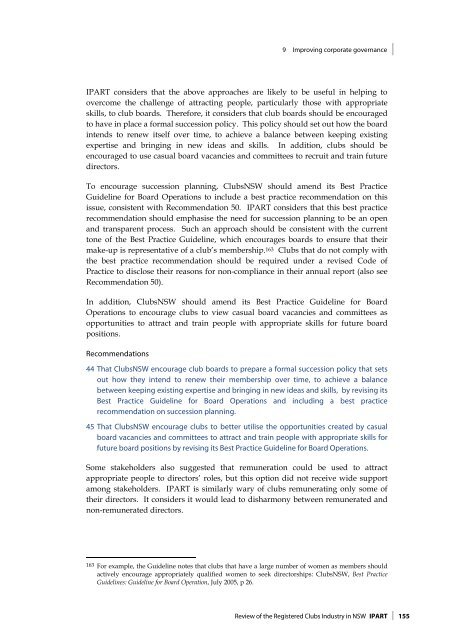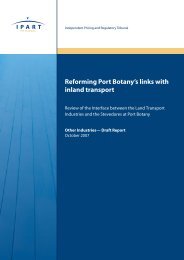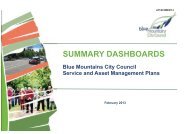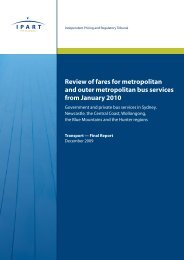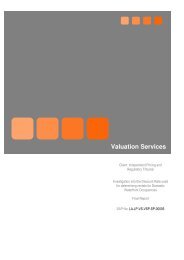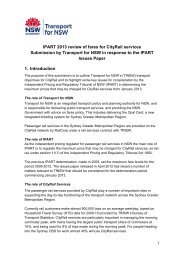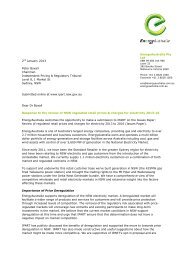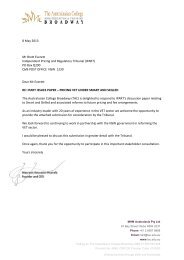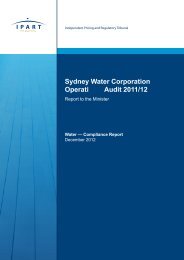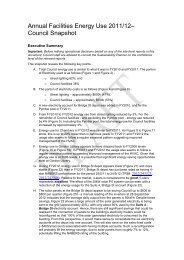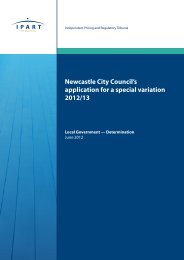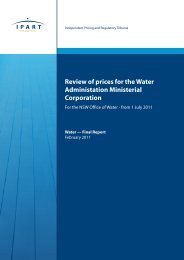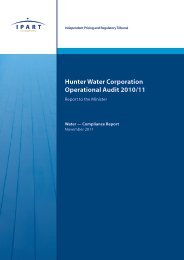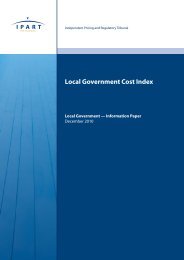Review of the Registered Clubs Industry in NSW - Clubs NSW
Review of the Registered Clubs Industry in NSW - Clubs NSW
Review of the Registered Clubs Industry in NSW - Clubs NSW
You also want an ePaper? Increase the reach of your titles
YUMPU automatically turns print PDFs into web optimized ePapers that Google loves.
9 Improv<strong>in</strong>g corporate governance<br />
IPART considers that <strong>the</strong> above approaches are likely to be useful <strong>in</strong> help<strong>in</strong>g to<br />
overcome <strong>the</strong> challenge <strong>of</strong> attract<strong>in</strong>g people, particularly those with appropriate<br />
skills, to club boards. Therefore, it considers that club boards should be encouraged<br />
to have <strong>in</strong> place a formal succession policy. This policy should set out how <strong>the</strong> board<br />
<strong>in</strong>tends to renew itself over time, to achieve a balance between keep<strong>in</strong>g exist<strong>in</strong>g<br />
expertise and br<strong>in</strong>g<strong>in</strong>g <strong>in</strong> new ideas and skills. In addition, clubs should be<br />
encouraged to use casual board vacancies and committees to recruit and tra<strong>in</strong> future<br />
directors.<br />
To encourage succession plann<strong>in</strong>g, <strong>Clubs</strong><strong>NSW</strong> should amend its Best Practice<br />
Guidel<strong>in</strong>e for Board Operations to <strong>in</strong>clude a best practice recommendation on this<br />
issue, consistent with Recommendation 50. IPART considers that this best practice<br />
recommendation should emphasise <strong>the</strong> need for succession plann<strong>in</strong>g to be an open<br />
and transparent process. Such an approach should be consistent with <strong>the</strong> current<br />
tone <strong>of</strong> <strong>the</strong> Best Practice Guidel<strong>in</strong>e, which encourages boards to ensure that <strong>the</strong>ir<br />
make-up is representative <strong>of</strong> a club’s membership. 163 <strong>Clubs</strong> that do not comply with<br />
<strong>the</strong> best practice recommendation should be required under a revised Code <strong>of</strong><br />
Practice to disclose <strong>the</strong>ir reasons for non-compliance <strong>in</strong> <strong>the</strong>ir annual report (also see<br />
Recommendation 50).<br />
In addition, <strong>Clubs</strong><strong>NSW</strong> should amend its Best Practice Guidel<strong>in</strong>e for Board<br />
Operations to encourage clubs to view casual board vacancies and committees as<br />
opportunities to attract and tra<strong>in</strong> people with appropriate skills for future board<br />
positions.<br />
Recommendations<br />
44 That <strong>Clubs</strong><strong>NSW</strong> encourage club boards to prepare a formal succession policy that sets<br />
out how <strong>the</strong>y <strong>in</strong>tend to renew <strong>the</strong>ir membership over time, to achieve a balance<br />
between keep<strong>in</strong>g exist<strong>in</strong>g expertise and br<strong>in</strong>g<strong>in</strong>g <strong>in</strong> new ideas and skills, by revis<strong>in</strong>g its<br />
Best Practice Guidel<strong>in</strong>e for Board Operations and <strong>in</strong>clud<strong>in</strong>g a best practice<br />
recommendation on succession plann<strong>in</strong>g.<br />
45 That <strong>Clubs</strong><strong>NSW</strong> encourage clubs to better utilise <strong>the</strong> opportunities created by casual<br />
board vacancies and committees to attract and tra<strong>in</strong> people with appropriate skills for<br />
future board positions by revis<strong>in</strong>g its Best Practice Guidel<strong>in</strong>e for Board Operations.<br />
Some stakeholders also suggested that remuneration could be used to attract<br />
appropriate people to directors’ roles, but this option did not receive wide support<br />
among stakeholders. IPART is similarly wary <strong>of</strong> clubs remunerat<strong>in</strong>g only some <strong>of</strong><br />
<strong>the</strong>ir directors. It considers it would lead to disharmony between remunerated and<br />
non-remunerated directors.<br />
163 For example, <strong>the</strong> Guidel<strong>in</strong>e notes that clubs that have a large number <strong>of</strong> women as members should<br />
actively encourage appropriately qualified women to seek directorships: <strong>Clubs</strong><strong>NSW</strong>, Best Practice<br />
Guidel<strong>in</strong>es: Guidel<strong>in</strong>e for Board Operation, July 2005, p 26.<br />
<strong>Review</strong> <strong>of</strong> <strong>the</strong> <strong>Registered</strong> <strong>Clubs</strong> <strong>Industry</strong> <strong>in</strong> <strong>NSW</strong> IPART 155


